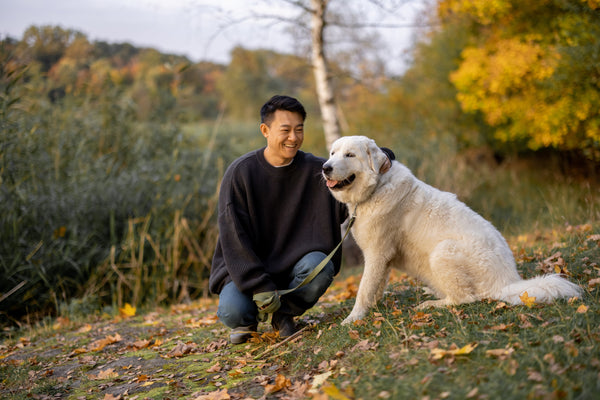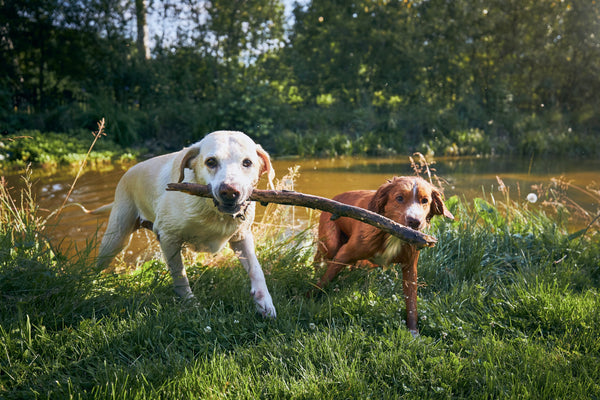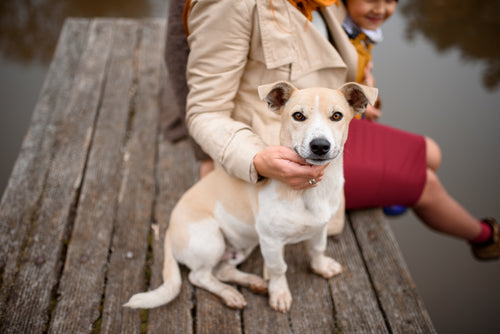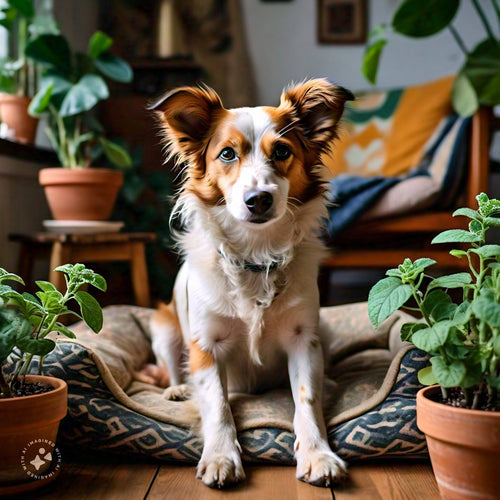Are you ready to add a new furry member to your family? We know that welcoming a dog into your home is an exciting adventure, but it also comes with great responsibility. We understand the importance of ensuring our pups have a happy and healthy life by providing them with proper care, training, and socialization. By following this comprehensive guide, you'll learn all the necessary tips and tricks to raise a well-behaved and devoted companion! So let's dive in and unleash the knowledge on all things canine.
Keeping Your Dog Physically Fit and Healthy
One of the most important duties of a dog owner is providing for your pet's basic health needs. When dogs don't receive the proper nutrition, exercise, and care they need, it can lead to preventable illnesses and troublesome behaviors like chewing, digging, and aggression. Yikes!
But fear not, because, with good food, fun activities, and regular vet check-ups, your pup will be back to its tail-wagging self! Don't forget to use the best dog muzzle UK for added safety and improved behavior.
Supplying Quality Nutrition
Choosing the right diet is the foundation of keeping your dog fit and energized. Select a premium commercial dog food formulated specifically for your dog's size, age, and activity level. Stay away from cheap brands with fillers and follow the recommended daily feeding amount for weight maintenance.
Additionally, make sure your pup always has access to fresh and clean water in a spill-proof bowl. Trust us, nobody likes drinking from a dirty bowl...not even your dog. Plus, did you know that frequent water changes can actually help improve your pup's hydration levels? It's true! Dogs prefer and need hydration from freshwater sources, so keep that bowl topped up.
Exercising Both Body and Mind
We all know that our pups are susceptible to weight gain, just like us. But did you know that obesity can lead to some major health problems? That's right, diabetes, heart issues, and joint strain are all on the table if we don't pay close attention to our pup's weight. But fret not, we've got some awesome tips to keep your pooch in tip-top shape!
First things first, calculate your dog's ideal weight range based on their breed. Then, make sure to weigh them regularly and measure their food portions accordingly. If you notice they need a little extra help shedding some pounds, consult your vet for a personalized weight loss plan. And remember, a happy and healthy dog means a happy and healthy you!
But let's not just stick to boring old walks when it comes to exercise. Mix things up with some fun activities like fetching at the park, taking a dip in the pool (yes, dogs can swim too!), exploring new hiking trails, or challenging their brains with food puzzle toys.
Social interaction is also important for our furry friends. So don't forget to schedule some playdates with their favorite canine pals. It's a great way for them to burn off energy and keep boredom at bay.
Last but not least, tailor your pup's exercise routine based on their individual needs. Take into account their age, health status, and personal preferences when determining how much daily exercise they need. Whether your pup is a high-energy Labrador or a low-key Cavalier King Charles Spaniel, there's an exercise plan perfect for them.
Scheduling Veterinary Wellness Care
We know that your furry friend is more than just a pet - they're a member of your family. That's why it's important to partner with a trusted veterinarian who can provide professional guidance to keep your dog their healthiest self!
Make sure to schedule annual wellness checkup exams to catch any problems early and give your pup the best care possible. Plus, diagnostic bloodwork can give important insight into organ function and disease risks, ensuring your dog stays in top shape. And don't forget to stay up-to-date on vaccines - it's crucial for protecting against contagious and potentially fatal diseases like parvo, rabies, and distemper.
But that's not all - administering prescribed heartworm and flea/tick prevention year-round is key for keeping your dog healthy and happy. When it comes to spaying or neutering, not only does this routine surgery reduce the risks of certain cancers, but it can also lead to a calmer and better-behaved pet.
Most importantly, we know accidents happen, so make sure to keep your vet's emergency clinic number handy and know the route to the nearest after-hours facility.
Effective Techniques for Training Your Dog
Beyond basic health, every dog needs guidance and boundaries through training. Well-trained dogs are better equipped to handle the challenges of the human world without developing anxieties and bad habits. In fact, modern reward-based methods make training a fun and exciting bonding experience for both you and your furry best friend.

Starting Young Sets the Stage
Enroll puppies into “kindergarten” group obedience classes as early as 8 weeks old for prime socialization with other dogs and people. This prime socialization opportunity not only helps prevent fearful reactions, but also allows your puppy to absorb training concepts quickly during their developmental months of 3-16 weeks. From leash manners to potty training, basic cues like "sit" and "down," and polite playtime with other pups, "kindergarten" classes will give your dog the perfect foundation for well-adjusted adulthood.
Motivating Desired Responses
Positive reinforcement is all about rewarding your dog when they do something good. And trust us, it works like a charm. Whenever your pup does a trick or follows a command on their own, make sure to give them high-value treats, praise, playtime, and snuggles galore. This not only makes them feel loved and appreciated but also motivates them to repeat those good behaviors.
But here's the trick for best results - use a reward marker like a click or verbal "yes!" right when your dog does the right thing before giving them a treat. This helps create a connection between the action and the reward, making it easier for your dog to understand. Remember to keep training sessions short, frequent, and fun! Your pup will learn faster and have a blast doing it.
Avoiding Problem Behaviors
We all know that our furry friends are full of energy and sometimes they just can't help but let it out in ways that may not always be acceptable to us humans. Whether it's jumping on guests, digging up the yard, or chewing on your brand-new couch (yikes!), these behaviors can definitely put a damper on our day.
First off, it's important to remember that consistency is key when it comes to training your pup. That means everyone in the household should use the same simple commands, tone, and rules of conduct. Trust us, this will help avoid any confusion and ensure your dog understands what is expected of them.
But let's be real, sometimes our dogs just can't resist their natural instincts to do things that may not always please us. That's where redirection comes in! Instead of scolding or punishing your pup for unwanted behaviors, simply interrupt with a firm "Ah ah!" and redirect their energy towards a positive alternative, like fetching a toy or showing off a trick. This approach not only prevents the reinforcement of bad habits, but also allows for you to reward your dog for good behavior.
Troubleshooting Serious Issues
While basic training definitely helps with common puppy shenanigans, sometimes more serious behavioral issues can arise. And we're not talking about your pup chewing on your favorite shoes (although that can be pretty frustrating too!). We're talking about things like aggression, intense fear, or separation anxiety.
These issues require professional intervention from a certified dog trainer who knows how to address them using positive support methods. In some cases, medication prescribed by a veterinary behaviorist may also be necessary for optimal results. But don't wait too long to seek help - with the right expertise, improvement is always possible.

Understanding Your Dog's Unique Behaviors
In addition to health and training, building an exceptional bond with your dog requires understanding their perspectives and needs as a species. Learn your individual dog’s unique personality and aptitudes to make them feel safe and enrich their daily life.
Reading Your Dog's Body Language
Dogs "speak" through body language more than vocalizations. Notice details like ear position, tail carriage, facial expressions, and posture to interpret your dog’s mood. These along with lip or nose licking, yawning, shaking off, and whale eye can be signs of anxiety.
Raised hackles often indicate fear, so it's important to address any concerns your pet may have and make them feel safe and loved. On the other hand, play bows and smiles are signs of happiness - which means your pet is definitely feeling joy when they see you! By recognizing these nonverbal cues, you can deepen your relationship with your furry friend and create a stronger connection.
Respecting Their Limits
Avoid overwhelming your dog with too much stimulation, and respect if they indicate a need for space. If your dog turns away, puts up a paw, or hides when petted, they are signaling "stop." Overeager children and strangers may misread dogs’ stress signals, so be sure to advocate for your dog’s needs politely in public.
Providing Mental Enrichment
We know how it goes - boredom can lead to some seriously naughty behavior in our four-legged companions. So let's talk about toys. Not just any toys, but puzzle toys. These brain teasers are perfect for keeping your dog's mind sharp and focused. Plus, it's a great way to sneak in some extra mental exercise while they play.
Maximizing Quality Bonding
Sure, taking your dog for a walk and playing fetch are great ways to bond, but why not kick it up a notch and incorporate training sessions into your daily routine? Not only will you both have fun, but your pup will also be learning valuable skills and behaviors.
But don't forget to slow down and savor those quiet moments too. Nothing beats the feeling of a warm snuggle or a gentle brush through their fur as they relax by your side.
Conclusion: A Guide for the Journey
Bringing home a furry friend is the start of an epic adventure - one that will bring you endless snuggles, tail wags, and slobbery kisses. But let's not forget about the important stuff too! By focusing on preventative health with top-notch food, plenty of playtime, and regular vet visits, you'll kickstart your pup's life on a path to ultimate comfort and wellness.
There's much to learn when you welcome a dog into your heart and home, but the effort pays dividends in healthy years of fun, friendship, and unconditional love only a dog can provide.







